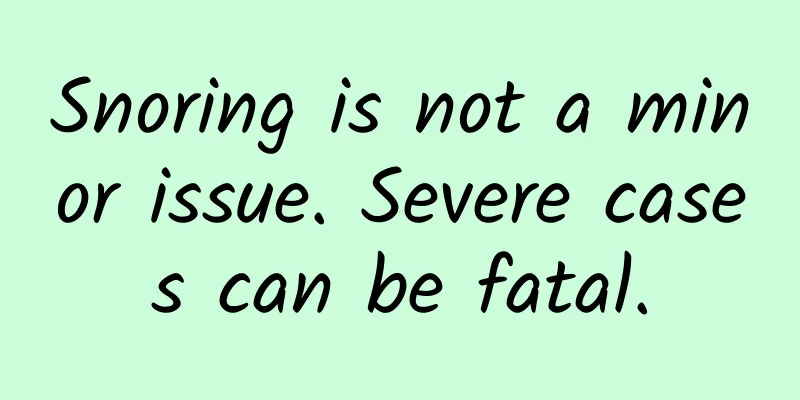Snoring is not a minor issue. Severe cases can be fatal.

|
Many people snore, and it was even once considered a sign of a sound sleep. In fact, snoring is not only annoying to the ear, but also has a negative impact on the body! Recently, a doctor shared a case of his patient on social media. Because of snoring, the doctor asked the patient to receive standardized treatment, but the patient did not receive treatment and eventually died suddenly in his sleep. However, this situation is not an isolated case. Let's take a look at the relevant reports in recent years: A man in Xiamen died of apnea caused by snoring while sleeping! The man who died unfortunately snored while sleeping for a long time. When the incident happened, he fell asleep as usual. What his family did not expect was that after this sleep, the young man never woke up again. Snoring is loud and there are breathing pauses. The sound is sometimes louder and sometimes softer, and suddenly there is no sound. It may be a phenomenon of apnea, which will cause hypoxia and severe cases may cause sudden death at night. There are many cases of death due to severe sleep apnea every year. One of them is a 40-year-old female snorer who had to stay in a hotel for one night because the hospital did not have a sleep monitoring bed. As a result, she died of severe sleep apnea. One night in April 2010, the snoring of the 4-year-old obese child Xiao Dingdang suddenly stopped and his body became cold. His father hurriedly gave him artificial respiration, but it didn't work after a long time. He called 120 and sent the child to the hospital emergency room for emergency treatment. The doctor gave him ten injections of cardiac stimulant but couldn't wake him up again. The hospital finally concluded that Xiao Dingdang died of sleep apnea syndrome. Snoring is more terrible than you think! Snoring is also called "snoring syndrome" in medicine. It can be divided into benign (80%) and malignant (20%) types, and can occur in men, women, young and old. "Benign snoring" : The snoring is even and changes with sleeping position. "Malignant snoring" : Not only is the snoring loud, but the snoring always stops during snoring. After ten or even dozens of seconds, the snoring starts again with a loud snoring sound. Generally speaking, snoring occurs when: Male>Female Thick neck>thin neck Fat person > thin person Smoking>Non-smoking Drinking > Not drinking When the upper airway is blocked during sleep, breathing stops for a short period of time (≥10 seconds), which is called apnea. When apnea occurs, the sleep structure is disrupted, the respiratory airflow is interrupted, and the patient suffers from hypoxia and hypercapnia, causing damage to multiple systems throughout the body, such as: Hypertension, coronary heart disease, arrhythmia, diabetes, kidney disease, stroke, memory loss, Alzheimer's disease, mental disorder, sudden death at night... 1. Cause myocardial infarction: Severe snoring can cause early damage to heart function. Snoring is the culprit for myocardial infarction in many people. 2. Increased risk of stroke: During sleep, once sleep apnea occurs, the body will be deprived of oxygen, which will not only cause arrhythmias, cardiovascular damage and vascular sclerosis, but also increase the risk of stroke. 3. Increased blood pressure: Sleep apnea is an independent risk factor for hypertension. When apnea occurs, the heart rate increases, blood vessels contract, and systolic blood pressure can instantly reach 280-300 mmHg (normally no more than 140 mmHg). 4. Impact on sexual function: Snoring is also related to male sexual function, which often manifests as impotence, decreased libido, and even sexual dysfunction. Doctor’s reminder: People with these symptoms must see this! "Snoring is not a disease, but it can be fatal if it lasts too long." Continuous snoring is like a fever, it is actually a distress signal from the body. Most patients with sleep apnea are repeatedly awakened by snoring, but they do not know the pattern of their snoring or why they always wake up, so it is generally difficult for them to detect whether they have apnea. The following five points can help you make a preliminary judgment: 1. Do you often feel dizzy, weak, and tired during the day, wanting to sleep at any time; but not feeling refreshed after sleeping? 2. Has your partner noticed that you snore loudly and hold your breath when you sleep—the snoring stops suddenly, and it takes a while before you hear a "puff" sound of exhalation? 3. Do you have a disordered sleep rhythm and wake up frequently? Sometimes you even wake up suddenly because you can't breathe. Do you often feel chest tightness or difficulty breathing when you wake up? 4. Do you have hypertension or are you being treated for hypertension? 5. Is your BMI (BMI=weight in kg/height in m2) greater than 24, or your neck circumference greater than 40 cm? If the answer to three of the above questions is "yes", then the risk of suffering from sleep apnea syndrome is very high. You need to go to a regular hospital for sleep breathing monitoring as soon as possible and follow the doctor's advice. A simple way to judge is that when you hear someone around you snore and suddenly stop snoring, as if they have passed out, and the snoring is intermittent, this indicates that they have experienced apnea. Even worse, if they are woken up by the snoring in their sleep, this should be taken seriously. In addition, if a person snores 5 out of 7 days, this also requires seeing a doctor. Reduce snoring and prevent sudden death, try these 5 tips If you want to solve the problem of snoring, it is recommended to do the following. 1. Lose weight: Obese people have a lot of fat attached around their respiratory tract, which affects the airflow and makes them more prone to snoring. Controlling weight is the simplest and most effective way to deal with snoring. 2. Quit smoking and drinking: Long-term smoking can easily lead to inflammation of the nasopharyngeal mucosa and narrowing of the respiratory tract, thus inducing snoring. Excessive drinking can relax the muscles of the whole body, including the throat muscles, resulting in snoring. 3. Treatment of nasopharyngeal diseases: Some patients are not obese, but due to other reasons such as rhinitis, nasal polyps, enlarged tonsils, enlarged tongue, or poor maxillofacial structure, they may suffer from abnormalities in the structure and function of the upper airway and may also experience sleep apnea. 4. Sleeping on your side: Sleeping on your side can effectively prevent the tongue, soft palate, and uvula from relaxing and falling back during sleep, thus preventing the upper airway from becoming blocked. In addition, using a pillow or a long towel rolled up and placed behind you can reduce the chance of rolling over and lying flat. 5. Wearing a ventilator: Wearing a portable non-invasive ventilator during sleep is a reliable and effective way to treat sleep apnea. It can deliver a certain amount of positive pressure air to open the blocked upper airway, make breathing smooth, and obtain efficient sleep breathing quality. About the Author: Guo Yang, chief physician, Shenyang No. 10 People's Hospital, deputy director of the respiratory ward 1, member of the Asian Cryosurgery Society, member of the Popular Science and Health Education Working Committee of the Chinese Medical Education Association, young member of the Tuberculosis Branch of the Liaoning Medical Association, standing member of the Traditional Chinese Medicine Lung Rehabilitation Professional Committee of the Liaoning Traditional Chinese Medicine Association, standing director of the Multidisciplinary Diagnosis and Treatment Professional Committee of the Liaoning Cell Biology Society, director of the Respiratory Endoscopy Branch of the World Endoscopy Association, member of the First Respiratory Disease Prevention and Control Professional Committee of the Liaoning Preventive Medicine Association, member of the Molecular Diagnosis Professional Committee of the Liaoning Cell Biology Society, member of EABIP, member of IBESociety, editorial board member of "Chinese Medical Science", young editorial board member of "Modern Medicine and Health", reviewer, four monographs, two utility model invention patents. Completed one project of the Shenyang Health Commission and one is under research. Published more than 10 papers in national core journals and published 2 SCI papers as the first author. |
>>: Is water spinach a "gout vegetable"? Rehabilitate the name of water spinach!
Recommend
Why did my period come three days early?
Menstruation refers to the physiological symptom ...
How to treat gynecological trichomoniasis
As women age, they will develop some diseases, an...
Low progesterone usually causes bleeding for a few days
Progesterone can help pregnant women stimulate ut...
Where is the best place to travel in China in September? What to wear for island travel
Traveling can now be said to be the first choice ...
What is the cause of lower abdominal distension and excessive leucorrhea?
Women are very prone to gynecological diseases, a...
Can Schefflera take root in water? How to care for hydroponic Schefflera
Schefflera is very common in our daily life. It i...
“Acne” is actually related to “eating too much salt”, who knows?
People often ask: Why do I always get acne? Why d...
The Importance of Plaque Control During Orthodontic Treatment
This is the 4189th article of Da Yi Xiao Hu Autho...
What to do if there is a hypoechoic nodule in the right breast
We all know that breasts are the most representat...
Why is my private part painful and itchy?
I believe many people know that due to the develo...
I want breast enhancement! Is it okay to just eat more celery fried with soybeans?
Celery is a healthy dish in our lives. If we insi...
How to treat yellow leucorrhea with odor?
Leucorrhea is a secretion from the vagina. Althou...
What is the cause of yellow blood in leucorrhea?
When women have abnormal leucorrhea, they should ...
How to increase menstrual flow
If a woman has a small amount of menstrual blood,...
When is the best time to take birth control pills?
As today's society develops rapidly, young pe...









